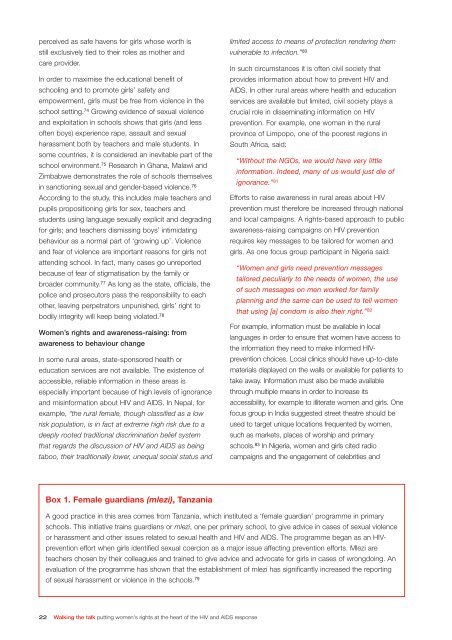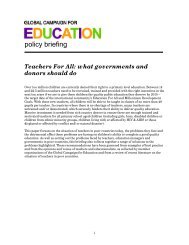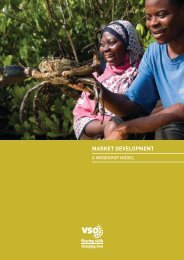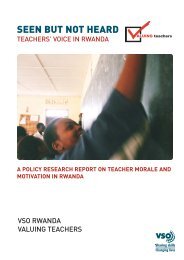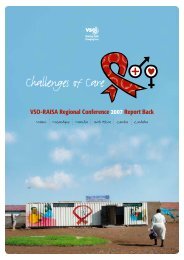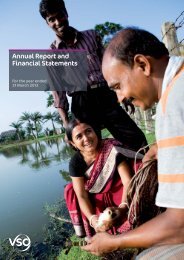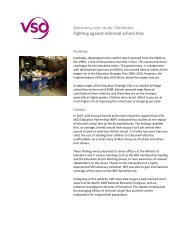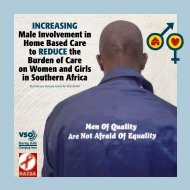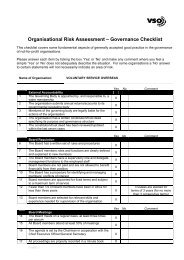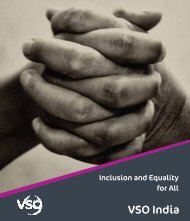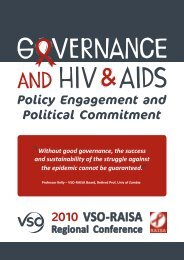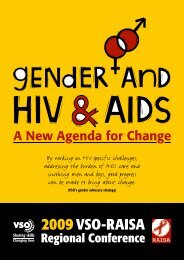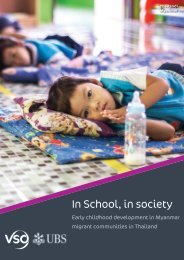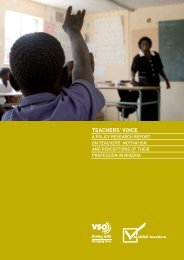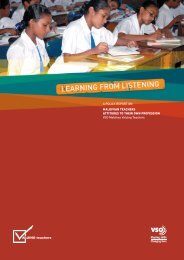Walking the Talk - VSO
Walking the Talk - VSO
Walking the Talk - VSO
Create successful ePaper yourself
Turn your PDF publications into a flip-book with our unique Google optimized e-Paper software.
perceived as safe havens for girls whose worth isstill exclusively tied to <strong>the</strong>ir roles as mo<strong>the</strong>r andcare provider.In order to maximise <strong>the</strong> educational benefit ofschooling and to promote girls’ safety andempowerment, girls must be free from violence in <strong>the</strong>school setting. 74 Growing evidence of sexual violenceand exploitation in schools shows that girls (and lessoften boys) experience rape, assault and sexualharassment both by teachers and male students. Insome countries, it is considered an inevitable part of <strong>the</strong>school environment. 75 Research in Ghana, Malawi andZimbabwe demonstrates <strong>the</strong> role of schools <strong>the</strong>mselvesin sanctioning sexual and gender-based violence. 76According to <strong>the</strong> study, this includes male teachers andpupils propositioning girls for sex, teachers andstudents using language sexually explicit and degradingfor girls; and teachers dismissing boys’ intimidatingbehaviour as a normal part of ‘growing up’. Violenceand fear of violence are important reasons for girls notattending school. In fact, many cases go unreportedbecause of fear of stigmatisation by <strong>the</strong> family orbroader community. 77 As long as <strong>the</strong> state, officials, <strong>the</strong>police and prosecutors pass <strong>the</strong> responsibility to eacho<strong>the</strong>r, leaving perpetrators unpunished, girls’ right tobodily integrity will keep being violated. 78Women’s rights and awareness-raising: fromawareness to behaviour changeIn some rural areas, state-sponsored health oreducation services are not available. The existence ofaccessible, reliable information in <strong>the</strong>se areas isespecially important because of high levels of ignoranceand misinformation about HIV and AIDS. In Nepal, forexample, “<strong>the</strong> rural female, though classified as a lowrisk population, is in fact at extreme high risk due to adeeply rooted traditional discrimination belief systemthat regards <strong>the</strong> discussion of HIV and AIDS as beingtaboo, <strong>the</strong>ir traditionally lower, unequal social status andlimited access to means of protection rendering <strong>the</strong>mvulnerable to infection.” 80In such circumstances it is often civil society thatprovides information about how to prevent HIV andAIDS. In o<strong>the</strong>r rural areas where health and educationservices are available but limited, civil society plays acrucial role in disseminating information on HIVprevention. For example, one woman in <strong>the</strong> ruralprovince of Limpopo, one of <strong>the</strong> poorest regions inSouth Africa, said:“Without <strong>the</strong> NGOs, we would have very littleinformation. Indeed, many of us would just die ofignorance.” 81Efforts to raise awareness in rural areas about HIVprevention must <strong>the</strong>refore be increased through nationaland local campaigns. A rights-based approach to publicawareness-raising campaigns on HIV preventionrequires key messages to be tailored for women andgirls. As one focus group participant in Nigeria said:“Women and girls need prevention messagestailored peculiarly to <strong>the</strong> needs of women, <strong>the</strong> useof such messages on men worked for familyplanning and <strong>the</strong> same can be used to tell womenthat using [a] condom is also <strong>the</strong>ir right.” 82For example, information must be available in locallanguages in order to ensure that women have access to<strong>the</strong> information <strong>the</strong>y need to make informed HIVpreventionchoices. Local clinics should have up-to-datematerials displayed on <strong>the</strong> walls or available for patients totake away. Information must also be made availablethrough multiple means in order to increase itsaccessibility, for example to illiterate women and girls. Onefocus group in India suggested street <strong>the</strong>atre should beused to target unique locations frequented by women,such as markets, places of worship and primaryschools. 83 In Nigeria, women and girls cited radiocampaigns and <strong>the</strong> engagement of celebrities andBox 1. Female guardians (mlezi), TanzaniaA good practice in this area comes from Tanzania, which instituted a ‘female guardian’ programme in primaryschools. This initiative trains guardians or mlezi, one per primary school, to give advice in cases of sexual violenceor harassment and o<strong>the</strong>r issues related to sexual health and HIV and AIDS. The programme began as an HIVpreventioneffort when girls identified sexual coercion as a major issue affecting prevention efforts. Mlezi areteachers chosen by <strong>the</strong>ir colleagues and trained to give advice and advocate for girls in cases of wrongdoing. Anevaluation of <strong>the</strong> programme has shown that <strong>the</strong> establishment of mlezi has significantly increased <strong>the</strong> reportingof sexual harassment or violence in <strong>the</strong> schools. 7922 <strong>Walking</strong> <strong>the</strong> talk putting women's rights at <strong>the</strong> heart of <strong>the</strong> HIV and AIDS response


